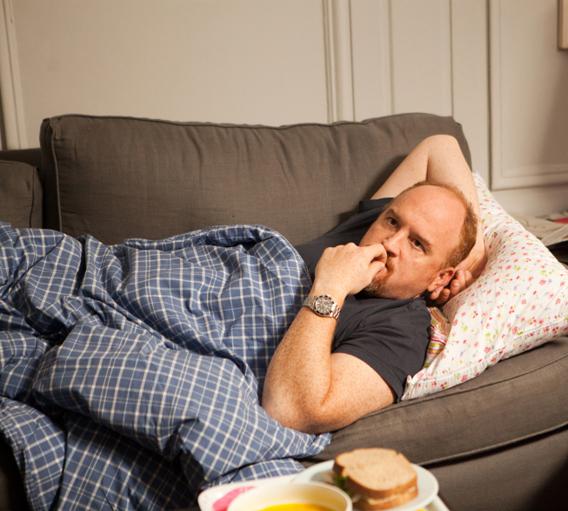Dear Allison and Jonah,
A couple of months ago, after watching the first few episodes of Girls, I impulsively wrote that the HBO series had instantly become the best show on TV, surpassing what, to my mind, was the reigning champ: Louie, the unclassifiable half-hour FX show written, directed, produced, and edited by comedian Louis C.K., who is also the star. The rest of Girls’ first season rewarded those expectations; I enjoyed it from start to finish as much as any season of TV since the fourth season of The Wire. But if I was granted the power to keep one and only one show on the air, across all networks and genres, my choice would still be Louie. Let me explain.
Even the very best shows—not only Girls but Breaking Bad and Parks and Recreation and what have you—generally follow in the footsteps of series that have come before. Shows that truly attempt something never previously done are exceedingly rare. Louie is one of those shows.
What else can it be compared to? Sure, the snippets of C.K. doing stand-up at the Comedy Cellar and elsewhere vaguely resemble staged stand-up bits on Seinfeld. But only vaguely. And Louie himself, the put-upon everyman who is similar but not identical to C.K., might be compared to Curb Your Enthusiasm’s Larry David, who is similar but not identical to Larry David (who, of course, helped create Seinfeld). But that show keeps David in the kind of fictional (or semifictional) universe we’re accustomed to on TV, with a cast of regular characters and plotlines that extend through multiple episodes in the manner of a more typical sitcom.
Louie has none of those things. While the show’s premise, if it can be called that—single dad with two daughters bumbling through life in New York City—might feel familiar, almost nothing else does. Sit down with any particular episode, and there’s no telling what you’ll get. A meditation on the lingering effects of a Catholic upbringing, perhaps. Or a story about going to Afghanistan with the USO. It might be a fantasia on the theme of house-hunting. Or a scripted but highly autobiographical confrontation with another, more famous comedian accused of stealing Louie’s jokes. The episode might show you some of Louie’s stand-up, or it might not. It might consist of two separate stories, a series of vignettes, or one continuous narrative. It might be hilarious. Or it might not even try to be funny.
And the episode might be stunningly affecting and brilliant—or only so-so. One inevitable consequence of such an experimental approach is that the results vary. But they will always be interesting.
And they will always be worth talking about, even if our talk about them has to take a slightly different form than much of our talk about TV. We can’t speculate about what will happen next. Who knows? And it doesn’t really matter. Any will-they-or-won’t-they chatter about Louie and, say, Pamela, is mostly beside the point. Louie is, as Time TV critic James Poniewozik has written, “TV series as worldview,” and so a conversation about the show is necessarily a conversation about that worldview, how C.K. expresses it, what he captures about the current moment and what he doesn’t capture. It’s a conversation worth having.
